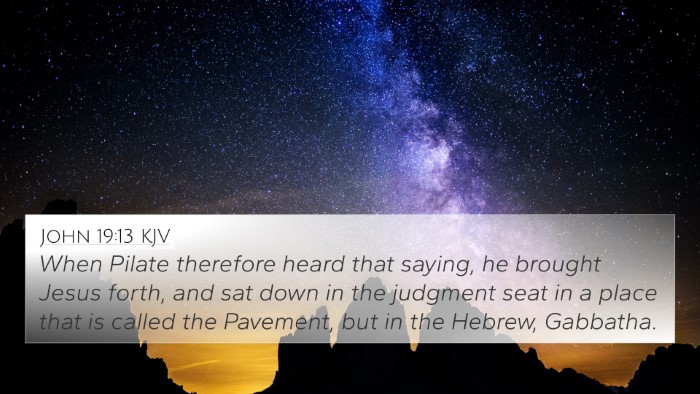Understanding Acts 21:40
Acts 21:40 states:
“And when he had given him license, Paul stood on the stairs, and beckoned with the hand unto the people. And when there was made a great silence, he spake unto them in the Hebrew tongue, saying...”
This verse highlights a pivotal moment in the life of the Apostle Paul, showcasing his role as a communicator and a proactive defender of his faith. To better understand its implications, let’s draw insights from various public domain commentaries.
Verse Meaning and Insights
Contextual Background:
The events surrounding Acts 21:40 occur as Paul returns to Jerusalem after his missionary journeys. He's faced hostility from the Jewish community due to his teachings, particularly regarding the Gentiles. He is taken into custody and eventually stands before the people to declare his case.
Insights from Commentaries
-
Matthew Henry:
Henry emphasizes the importance of Paul’s address. Having been given permission to speak, Paul’s ability to quiet the crowd demonstrates his authority and the respect he commands. His choice to speak in Hebrew signifies his desire to connect with the Jewish audience, illustrating a moment of cultural bridging.
-
Albert Barnes:
Barnes notes the significance of Paul’s gesture as he beckons for silence. This action reflects not only his calmness in the face of adversity but also references the profound responsibility he feels to effectively communicate his message about Jesus Christ.
-
Adam Clarke:
Clarke provides insight into the implications of Paul speaking in the Hebrew tongue. It is a strategic move that resonates deeply with the Jewish heritage and context, emphasizing the continuity of God’s covenant with Israel, which Paul seeks to elucidate to his audience.
Bible Verse Cross-References
Understanding Acts 21:40 can be enriched by various Bible cross-references that explore similar themes of communication, cultural adaptation, and the defense of faith. Here are several related verses:
- Acts 22:1: "Men, brethren, and fathers, hear ye my defence which I make now unto you." - Paul continues to address the people, further elaborating his testimony.
- Philippians 1:7: "Even as it is meet for me to think this of you all, because I have you in my heart; inasmuch as both in my bonds, and in the defence and confirmation of the gospel..." - Reflects Paul's commitment to the defense of the gospel.
- 1 Corinthians 9:22: "To the weak became I as weak, that I might gain the weak..." - Highlights Paul’s adaptability in communicating the gospel to diverse groups.
- Romans 1:16: "For I am not ashamed of the gospel of Christ: for it is the power of God unto salvation to every one that believeth..." - Paul's boldness in proclaiming the gospel reflects his commitment witnessed in Acts 21:40.
- Acts 26:1-2: "Then Agrippa said unto Paul, Thou art permitted to speak for thyself. Then Paul stretched forth the hand, and answered for himself." - Similar moments of Paul defending the faith.
- James 1:19: "Wherefore, my beloved brethren, let every man be swift to hear, slow to speak, slow to wrath." - Ties to Paul's thoughtful approach in communication.
- Matthew 10:16: "Behold, I send you forth as sheep in the midst of wolves: be ye therefore wise as serpents, and harmless as doves." - Encouragement for believers to act wisely in difficult situations.
Thematic Connections
1. Cultural Communication:
Paul’s choice to address the crowd in Hebrew highlights the theme of cultural sensitivity in evangelism, a vital practice for establishing connections with diverse audiences.
2. Testimony and Defense:
This verse precedes Paul’s personal testimony and defense of the gospel, showcasing the importance of sharing personal faith experiences to clarify misunderstandings.
3. Authority and Respect:
Paul’s ability to still the crowd underscores the respect he commands. This moment serves as a reminder of the power of a prepared and earnest witness.
Conclusion
Acts 21:40 offers profound insights into Paul's character and mission as an Apostle. His strategic and respectful communication emphasizes the importance of addressing diverse audiences in ways that resonate deeply with their cultural identities. The cross-referenced scriptures enhance our understanding of his actions and the broader themes of advocacy and faith in the New Testament.
Further Study and Exploration
For those seeking to deepen their understanding of Bible verses, utilizing tools like a Bible concordance or a Bible cross-reference guide can be immensely helpful. Engage in cross-referencing Bible studies to uncover rich connections across the Scriptures, enhancing your comprehension of both individual verses and the thematic tapestry of biblical teachings.

















